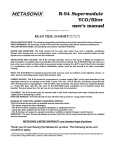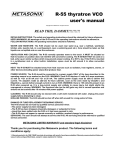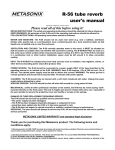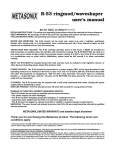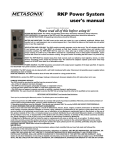Download indoor grease trap
Transcript
INDOOR GREASE TRAP/ INTERCEPTOR SIZING GUIDE INDOOR GREASE TRAP/ INTERCEPTOR SIZING GUIDE INDOOR GREASE TRAP/ INTERCEPTOR SIZING GUIDE Depending on your specific grease capturing needs, an indoor grease trap/interceptor may be an effective measure for preventing the discharge of fats, oils or grease into the sanitary sewer system. Manufactured interceptors come in varying sizes, usually based on a flow rate of gallons per minute, or GPM. We recommend consulting with a licensed plumber when determining the size of your interceptor. But for basic guidance, the following steps could be useful in determining the appropriate size of your new indoor grease trap/interceptor: Depending on your specific grease capturing needs, an indoor grease trap/interceptor may be an effective measure for preventing the discharge of fats, oils or grease into the sanitary sewer system. Manufactured interceptors come in varying sizes, usually based on a flow rate of gallons per minute, or GPM. We recommend consulting with a licensed plumber when determining the size of your interceptor. But for basic guidance, the following steps could be useful in determining the appropriate size of your new indoor grease trap/interceptor: Depending on your specific grease capturing needs, an indoor grease trap/interceptor may be an effective measure for preventing the discharge of fats, oils or grease into the sanitary sewer system. Manufactured interceptors come in varying sizes, usually based on a flow rate of gallons per minute, or GPM. We recommend consulting with a licensed plumber when determining the size of your interceptor. But for basic guidance, the following steps could be useful in determining the appropriate size of your new indoor grease trap/interceptor: Step 1: Step 1: Step 1: Determine the cubic size of your sink(s) by multiplying its length, width, and depth together (L x W x D). Determine the cubic size of your sink(s) by multiplying its length, width, and depth together (L x W x D). Determine the cubic size of your sink(s) by multiplying its length, width, and depth together (L x W x D). Step 2: Step 2: Step 2: Convert that number into gallons using the following conversion: 1 gallon = 231 cubic feet. Convert that number into gallons using the following conversion: 1 gallon = 231 cubic feet. Convert that number into gallons using the following conversion: 1 gallon = 231 cubic feet. Step 3: Step 3: Step 3: Estimate the capacity of the sink(s) measured in Step 1. Usually, 75% of the sink(s) will be filled with water, the remaining 25% will be dishes, utensils, etc. Multiply that factor as a percentage (e.g. 75% = 0.75, 25% = 0.25, etc.) by the number you calculated in Step 2. This will also serve as your flow rate. Estimate the capacity of the sink(s) measured in Step 1. Usually, 75% of the sink(s) will be filled with water, the remaining 25% will be dishes, utensils, etc. Multiply that factor as a percentage (e.g. 75% = 0.75, 25% = 0.25, etc.) by the number you calculated in Step 2. This will also serve as your flow rate. Estimate the capacity of the sink(s) measured in Step 1. Usually, 75% of the sink(s) will be filled with water, the remaining 25% will be dishes, utensils, etc. Multiply that factor as a percentage (e.g. 75% = 0.75, 25% = 0.25, etc.) by the number you calculated in Step 2. This will also serve as your flow rate. Step 4: Step 4: Step 4: Select a trap/interceptor that is the next size higher than your Select a trap/interceptor that is the next size higher than your Select a trap/interceptor that is the next size higher than your calculated flow rate. Example: your calculated flow rate is 78 calculated flow rate. Example: your calculated flow rate is 78 calculated flow rate. Example: your calculated flow rate is 78 GPM. Available interceptors are sized for 70 and 80 GPM. The GPM. Available interceptors are sized for 70 and 80 GPM. The GPM. Available interceptors are sized for 70 and 80 GPM. The most appropriate choice is the latter, an 80 GMP device. most appropriate choice is the latter, an 80 GMP device. most appropriate choice is the latter, an 80 GMP device. Additional sizing guidelines can be found in the most recent Additional sizing guidelines can be found in the most recent Additional sizing guidelines can be found in the most recent addition of the California Plumbing Code. A licensed plumber addition of the California Plumbing Code. A licensed plumber addition of the California Plumbing Code. A licensed plumber will be familiar with its provisions and can offer solutions unique will be familiar with its provisions and can offer solutions unique will be familiar with its provisions and can offer solutions unique to your needs. to your needs. to your needs. This guide and other helpful information can be found on the This guide and other helpful information can be found on the This guide and other helpful information can be found on the City’s website: www.cityoflakeport.com. City’s website: www.cityoflakeport.com. City’s website: www.cityoflakeport.com. CITY OF LAKEPORT MUNICIPAL SEWER DISTRICT CITY OF LAKEPORT MUNICIPAL SEWER DISTRICT CITY OF LAKEPORT MUNICIPAL SEWER DISTRICT Over 100 years of community pride, progress, and service. Over 100 years of community pride, progress, and service. Over 100 years of community pride, progress, and service. City Hall 225 Park Street Lakeport, CA 95453 City Hall 225 Park Street Lakeport, CA 95453 City Hall 225 Park Street Lakeport, CA 95453 Phone: 707-263-5615, ext. 30 E-mail: [email protected] Phone: 707-263-5615, ext. 30 E-mail: [email protected] Phone: 707-263-5615, ext. 30 E-mail: [email protected] OUTDOOR GREASE INTERCEPTOR SIZING GUIDE OUTDOOR GREASE INTERCEPTOR SIZING GUIDE OUTDOOR GREASE INTERCEPTOR SIZING GUIDE Outdoor, in-ground or above-ground grease interceptors are ideal for restaurants and other food service facilities that produce large amounts of fats, oil, and grease during food preparation. City Code allows for the use of two methods when sizing an outdoor interceptor. The first is based on criteria defined in the California Plumbing Code. A licensed plumber can provide excellent interceptor solutions to meet your needs based on this method. The second is the application of the Manning Formula, which is described here in greater detail: Outdoor, in-ground or above-ground grease interceptors are ideal for restaurants and other food service facilities that produce large amounts of fats, oil, and grease during food preparation. City Code allows for the use of two methods when sizing an outdoor interceptor. The first is based on criteria defined in the California Plumbing Code. A licensed plumber can provide excellent interceptor solutions to meet your needs based on this method. The second is the application of the Manning Formula, which is described here in greater detail: Outdoor, in-ground or above-ground grease interceptors are ideal for restaurants and other food service facilities that produce large amounts of fats, oil, and grease during food preparation. City Code allows for the use of two methods when sizing an outdoor interceptor. The first is based on criteria defined in the California Plumbing Code. A licensed plumber can provide excellent interceptor solutions to meet your needs based on this method. The second is the application of the Manning Formula, which is described here in greater detail: The Manning Formula: The Manning Formula: The Manning Formula: Interceptor Size (in gallons) = Flow rate (GPM)/sink or fixture x sum of fixture Ratings + the Discharge rate from any mechanical washers (i.e. dishwashers, glass washers, laundry machines, etc.) x a 24 minute retention Time. Interceptor Size (in gallons) = Flow rate (GPM)/sink or fixture x sum of fixture Ratings + the Discharge rate from any mechanical washers (i.e. dishwashers, glass washers, laundry machines, etc.) x a 24 minute retention Time. Interceptor Size (in gallons) = Flow rate (GPM)/sink or fixture x sum of fixture Ratings + the Discharge rate from any mechanical washers (i.e. dishwashers, glass washers, laundry machines, etc.) x a 24 minute retention Time. Flow Rates 0.5” pipe = 0.8 GPM/fixture 1.0 “ = 5.0 GPM/fixture 1.5 “ = 15 GPM/fixture 2.0” = 33 GPM/fixture 2.5” = 59 GPM/fixture 3.0” = 93 GPM/fixture Fixture Ratings 2,3, or 4 compartment sink = 1.0 1 or 2 compartment meat prep sink = 0.75 Pre-rinse sink = 0.5 1 or 2 compartment vegetable prep sink = 0.25 Can wash = 0.25 Mop sink = 0.25 Floor drain = 0.00 Flow Rates 0.5” pipe = 0.8 GPM/fixture 1.0 “ = 5.0 GPM/fixture 1.5 “ = 15 GPM/fixture 2.0” = 33 GPM/fixture 2.5” = 59 GPM/fixture 3.0” = 93 GPM/fixture Fixture Ratings 2,3, or 4 compartment sink = 1.0 1 or 2 compartment meat prep sink = 0.75 Pre-rinse sink = 0.5 1 or 2 compartment vegetable prep sink = 0.25 Can wash = 0.25 Mop sink = 0.25 Floor drain = 0.00 Flow Rates 0.5” pipe = 0.8 GPM/fixture 1.0 “ = 5.0 GPM/fixture 1.5 “ = 15 GPM/fixture 2.0” = 33 GPM/fixture 2.5” = 59 GPM/fixture 3.0” = 93 GPM/fixture Fixture Ratings 2,3, or 4 compartment sink = 1.0 1 or 2 compartment meat prep sink = 0.75 Pre-rinse sink = 0.5 1 or 2 compartment vegetable prep sink = 0.25 Can wash = 0.25 Mop sink = 0.25 Floor drain = 0.00 Using the charts above, you can calculate the size of the interceptor you need. Just plug them into the Manning Formula: Using the charts above, you can calculate the size of the interceptor you need. Just plug them into the Manning Formula: Using the charts above, you can calculate the size of the interceptor you need. Just plug them into the Manning Formula: Interceptor Size = [[(Flow Rate) x (Fixture Ratings)] + Discharge Rate] x 24 minute retention time Interceptor Size = [[(Flow Rate) x (Fixture Ratings)] + Discharge Rate] x 24 minute retention time Interceptor Size = [[(Flow Rate) x (Fixture Ratings)] + Discharge Rate] x 24 minute retention time Direct flow from dishwashers, laundry washers, glass washers, etc. is the discharge rate as determined by the manufacturer. This information should be available in your user’s manual or by contacting the manufacturer directly. Direct flow from dishwashers, laundry washers, glass washers, etc. is the discharge rate as determined by the manufacturer. This information should be available in your user’s manual or by contacting the manufacturer directly. Direct flow from dishwashers, laundry washers, glass washers, etc. is the discharge rate as determined by the manufacturer. This information should be available in your user’s manual or by contacting the manufacturer directly. 24 minute retention time is the minimum amount of time needed for grease to cool, condense, and separate from liquid. It is a constant for the purposes of this calculation. 24 minute retention time is the minimum amount of time needed for grease to cool, condense, and separate from liquid. It is a constant for the purposes of this calculation. 24 minute retention time is the minimum amount of time needed for grease to cool, condense, and separate from liquid. It is a constant for the purposes of this calculation. This guide and other helpful information (including calculation examples) can be found on the City’s website: www.cityoflakeport.com. This guide and other helpful information (including calculation examples) can be found on the City’s website: www.cityoflakeport.com. This guide and other helpful information (including calculation examples) can be found on the City’s website: www.cityoflakeport.com.




